Smart Packaging: Embracing Technology for Sustainable Solutions
It’s well known that technology has transformed the way we shop and interface with our favourite brands and services, but the data-landscape is now having a significant impact on fulfilment operations too. Among the wide array of new solutions entering the market, the integration of Artificial Intelligence (AI) technology has become a pivotal tool in transforming packaging and logistics practices. Businesses are actively seeking inventive ways to incorporate AI technology into their operations to bolster sustainability efforts.
Packing and Warehouse Automation
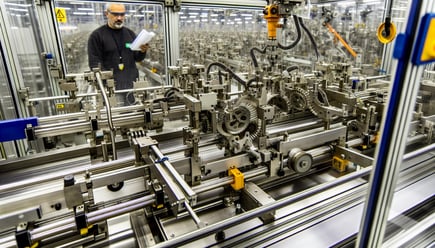
As the world increasingly prioritises environmental consciousness, businesses are actively seeking opportunities to minimise their carbon footprint and enhance sustainability. The packaging industry plays a pivotal role in this initiative, and AI has become an increasingly powerful ally in driving sustainable practices. Leveraging AI algorithms and machine learning capabilities, companies are making informed decisions, streamlining processes, and minimising waste, thereby promoting more sustainable operations.
AI-powered packing and warehouse automation have created a paradigm shift in the packaging industry. With advanced robotics and intelligent machines, companies can streamline packaging processes, reducing material wastage and boost overall efficiency. AI-driven systems can precisely measure and cut packaging materials and identify products with ease, ensuring minimal excess and maximum use.
Better still, automated warehouse systems facilitate better inventory management, reducing stockpiles and unnecessary resource consumption, while simplifying invoicing processes and offering avenues for warehouse optimisation to reduce downtime and maximise safety.
Logistics Processes
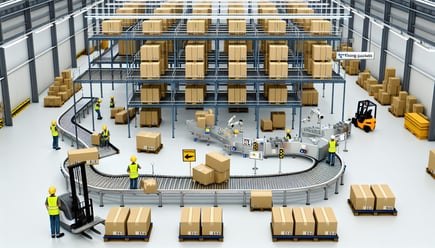
Efficient logistics are essential for sustainable packaging practices. AI can analyse vast datasets, including weather, traffic, and shipping patterns, to optimise delivery routes and schedules. By selecting the most eco-friendly transportation options and reducing transportation distances, companies can significantly diminish their carbon emissions. This not only benefits the environment but also leads to cost savings, rendering sustainable practices economically viable. AI can also assist businesses in benchmarking their performance, utilising predictive analytics to dynamically adjust their process flow, and formulating new strategies to consistently meet escalating sustainability endeavours.
To maximise their operational efficiency and leverage their data, UPS uses AI for smarter demand forecasting, ensuring superior resource allocation and substantial reductions in overheads in their service provision.
AI in Route-Planning
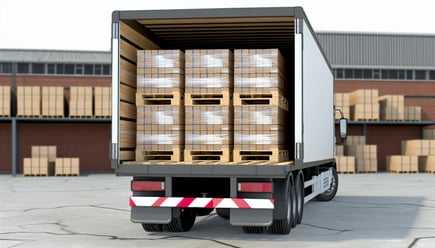
AI-based route-planning takes logistics optimisation a step further. By learning from real-time data, AI algorithms can adapt to changing conditions and determine the most fuel-efficient and time-saving routes for delivery vehicles. This not only reduces environmental impact but also ensures timely deliveries, augmenting customer satisfaction and enhancing workforce efficiency. Additionally, this facilitates scaling sustainability as technology ensures that the growing complexity of increased deliveries and demand can be met.
Systems such as Onfleet and Tooken offer last-mile route optimisation to minimise downtimes and maximise delivery efficiencies, empowering drivers to reach their destinations with reduced fuel consumption and less time spent on the road, thereby significantly alleviating congestion.
AI in Packaging Design and Manufacturing
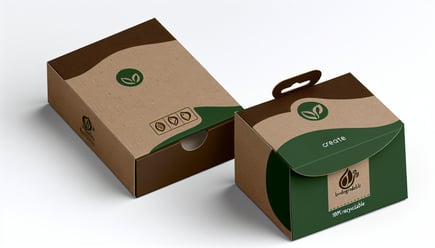
Incorporating AI into packaging design and manufacturing processes can yield resource-efficient and eco-friendly packaging solutions. AI can analyse customer preferences, product specifications, and material properties to design packaging that is both visually appealing and sustainable, providing high protection capacity without excess material. By making use of biodegradable and recyclable materials, companies are afforded the means to create greener packaging options without compromising quality or functionality. These new design systems arm packaging designers and suppliers with the tools to meet the requirements of an increasingly eco-conscious market.
From data-led design platforms to anti-counterfeit technology, AI's presence in packaging is expanding, fostering enhanced performance and reducing waste reaching landfills annually.
IoT in Packaging
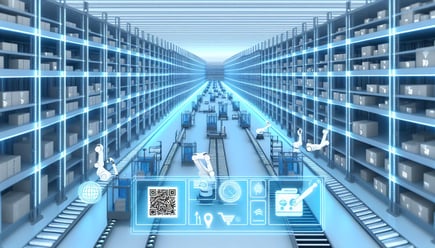
In addition to AI, the Internet of Things (IoT) is playing an increasingly significant role in the evolution of smart packaging. IoT devices embedded in packaging can provide real-time data on various parameters such as temperature, humidity, and location, ensuring the integrity and safety of products throughout the supply chain. For example, IoT-enabled sensors can monitor perishable goods during transit, alerting stakeholders to any deviations from optimal conditions and enabling proactive intervention to prevent spoilage or wastage.
What’s more, IoT technology enables track-and-trace functionality, allowing companies to gain insights into the entire lifecycle of their products. This visibility facilitates better inventory management, boosts transparency, and strengthens compliance with regulatory requirements. Businesses can therefore not only improve operational efficiency but also reduce environmental impact by minimising product losses and optimising resource usage.
AI in Distribution
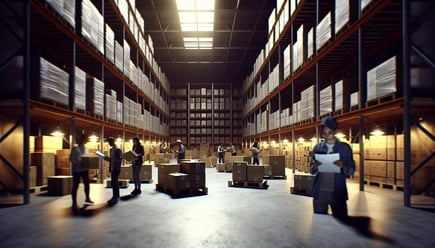
AI technology plays a crucial role in optimising distribution networks. Smart distribution centres equipped with AI can efficiently manage inventory, reduce order-processing times, and minimise product loss. This process of optimising the supply chain means companies can ensure that products reach consumers with reduced transit times and minimal environmental impact, removing needless steps and enabling essential packaging materials and products to reach end users quickly, affordably, and with less strain on the environment.
As you might expect, Amazon leads the way in utilising AI in distribution operations, integrating AI-powered robots into its warehouses to enhance the efficiency of picking, packing, and shipping products with remarkable precision. These robots employ advanced computer vision and machine learning algorithms to intelligently navigate the warehouse and fulfil orders with unmatched speed and consistency.
Looking Ahead: Challenges and Opportunities for AI
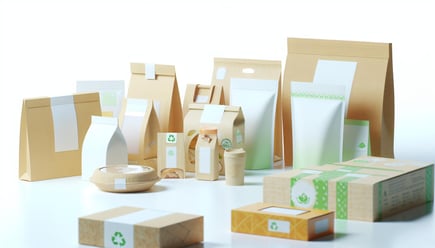
While AI offers promising solutions for sustainability in the packaging industry, challenges exist. Data privacy and security concerns, the high initial cost of implementing AI systems, and potential job displacements are among the key challenges. Nonetheless, with careful planning and collaboration, businesses can navigate these challenges and harness the full potential of AI for sustainability.
The packaging industry will no doubt play a notable role in mapping the real-world applications of AI in supply chain technology and sustainability, offering opportunities for industry innovators to lead the way in data-led approaches to manufacturing, fulfilment, and waste management.
At Allpack, we pride ourselves on offering process-intelligent solutions that integrate market-leading technology and innovative process flows to boost your packaging sustainability. Our team can add significant value to your packing processes by conducting efficiency reviews and applying best-in-class technology to improve flows, cut waste and reduce avoidable costs. To discover more about how we can enhance your packaging sustainability and reduce your environmental footprint, feel free to get in touch with us today by sending a message, calling us on 01543 396 700 or emailing sales@allpack.uk.com. Our team is prepared to assist you in your journey towards a more sustainable future.